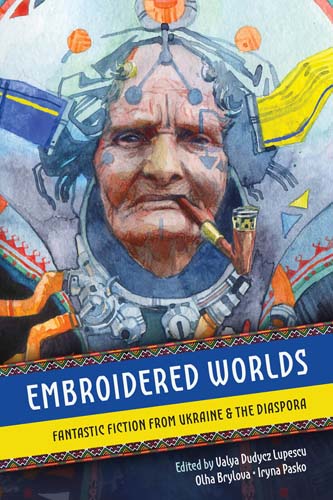Today, Emily Bell tells us why she and her publishing house stepped into the world of foreign language translations and what she learned in the process.

Hello – I’m Emily, a fantasy writer as well as an editor for Atthis Arts in Ferndale, Michigan. And of all the projects I ever saw myself taking on in a strange and uncertain future, I did not see Ukrainian translations. I’m not Ukrainian, or of Ukrainian culture or descent. So how did our little press in Ferndale get involved with Ukrainian translation? And what have I learned from it?
My spouse was pulled aside at Can*Con in 2022, to talk about a collection of stories hoping to raise money for Ukrainian charities. It had stories, it had a grant, but it had lost its publisher. We looked into it, knew the need for Ukrainian independence, and agreed to help.
I will not get into the details, but the more we learned, the more it unraveled. We lost the grant, we lost the editors, there were issues with the stories. Right as it was about to disintegrate, Chicago writer Valya Dudycz Lupescu, my spouse, Chris Bell, and I had a serious talk. This was too important, and we would not go back to the Ukrainian editors with the sound of explosions outside of their windows and tell them this wasn’t happening, after all their work, because it got too hard. We weren’t in a position to continue it as a direct fundraiser, but we would share these stories. We would make it work.
This is where the world stepped in. Ukrainian translators got us connected to the Ukrainian Book Institute, who offered us a grant. More than 1000 backers from over 30 countries helped fund the rest of the costs. Volunteers helped us get the book done on the grant schedule, reviewing, editing, proofreading. Embroidered Worlds: Fantastic Fiction from Ukraine and the Diaspora, edited by Valya Dudycz Lupescu, Olha Brylova, and Iryna Pasko was born. I sometimes lightly refer to this collection as “the book that made people fall asleep on their laptops all around the world.” But truly, it is a triumph; of Ukrainian art, spirit, and culture—and the power of global solidarity.
What have I learned from all this? Human translations are vital. They cost money, yes, as they should, but they are vital. There are nuances and choices to translation, much more than right or wrong or literal meaning. Thoughtfully translated stories share culture, share hearts, connect us. They are always, always underfunded. The people who advocate for them exhaust themselves appealing to those with resources.
If you are reading this, I ask you: please advocate for translations. Read them. Fund them. Talk about them.
As a personal note, if I had life to do over again, I would have been a translator. I was taught I had to do something that “made money,” hence my two engineering degrees. But, now I can give back. Now I can do something I never expected. This experience (and other personal issues) have also revived my passion for language. I’m currently learning and practicing four languages other than my own, and it is making me a happier, fuller person. It is helping me connect with the world.
Once the book was done, we shelved our exhaustion and moved on to a now packed release schedule, and vowed: no more surprise projects. Then we learned, within a couple days of another grant timeline, that Ігор Мисяк, a poet, a writer, and a combat medic now volunteer solider, had recently published a novel, Завод, before being killed by Russia. And it was available for translation.
The project, which will be The Factory by Igor Mysiak translated by Hanna Leliv, spoke to me. In the language of poets, the language of sorrow, and the language of hope.
I hope it will speak to you, also.
To Igor, I see you. And I look forward to reading your words. They will stay with me.
To the world, keep writing. We will find ways to share our stories.
---
E.D.E. Bell (she/her or e/em) is a fantasy writer and small press editor. A passionate vegan and earnest progressive, she feels strongly about issues related to equality and compassion. Her works are quiet and queer and often explore conceptions of identity and community, including themes of friendship, family, and connection. She lives in Ferndale, Michigan, where she writes stories, revels in garlic, and manages the creative side of her indie press, Atthis Arts. You can follow eir adventures at edebell.com.